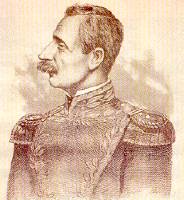
Ezequiel Zamora
Encyclopedia

Venezuela
Venezuela , officially called the Bolivarian Republic of Venezuela , is a tropical country on the northern coast of South America. It borders Colombia to the west, Guyana to the east, and Brazil to the south...
n soldier and leader of the Federalist
Federalist
The term federalist describes several political beliefs around the world. Also, it may refer to the concept of federalism or the type of government called a federation...
s in the Federal War
Federal War
The Federal War - also known as the Great War or the Five Year War - was a civil war in Venezuela between the conservative party and the liberal party about the monopoly of the conservatives of the land and the government positions, and their reluctance to grant any reforms. This drove the...
(Guerra Federal) of 1859-1863. His life was marked by the romanticism that characterized liberals of the time.
Zamora was born in Cúa
Cúa
Cúa is a small city capital of the Urdaneta Municipality, located in the Miranda State in the north of Venezuela with an altitude of 490 m...
, Miranda State. His parents were Alejandro Zamora and Paula Correa, modest landowners belonging to the white social class. During the early years of his childhood, he received basic education, typical of a rural area still disrupted by the struggles for independence from Spain.
Later, Zamora moved to Caracas
Caracas
Caracas , officially Santiago de León de Caracas, is the capital and largest city of Venezuela; natives or residents are known as Caraquenians in English . It is located in the northern part of the country, following the contours of the narrow Caracas Valley on the Venezuelan coastal mountain range...
, where he continued his primary school studies, the only formal education he received. However, thanks to the influence of his brother-in-law John Caspers, he received informal political training, influenced by the revolutionary movements in Europe. Zamora completed his education thanks to his friendly relationship with the lawyer José Manuel García. Zamora learned modern philosophy
Philosophy
Philosophy is the study of general and fundamental problems, such as those connected with existence, knowledge, values, reason, mind, and language. Philosophy is distinguished from other ways of addressing such problems by its critical, generally systematic approach and its reliance on rational...
and the foundations of Roman law
Roman law
Roman law is the legal system of ancient Rome, and the legal developments which occurred before the 7th century AD — when the Roman–Byzantine state adopted Greek as the language of government. The development of Roman law comprises more than a thousand years of jurisprudence — from the Twelve...
, and soon advocated the "principles of equality" and the need for their implementation in Venezuela.
After an aborted run for office as a member of the Liberal Party
Great Liberal Party of Venezuela
The Great Liberal Party of Venezuela was a political party in Venezuela, founded on August 21, 1840 by Antonio Leocadio Guzmán and Tomás Lander, through an editorial published by Guzmán at El Venezolano newspaper....
and amid claims of election irregularities, Zamora took up arms in 1846. He was captured 26 March 1847, and sentenced to death, but had his sentence commuted by President José Tadeo Monagas
José Tadeo Monagas
José Tadeo Monagas Burgos was President of Venezuela 1847-1851 and 1855–1858, and a hero of the Venezuelan War of Independence...
, who abolished the death penalty for political crimes.
In the Federalist War, Zamora was named the Federalist's "Chief Operating Officer of the West" on 22 February 1859. After leading successful battles in San Felipe, Yaracuy
San Felipe, Yaracuy
San Felipe is the capital of the Venezuelan state of Yaracuy. Former Venezuelan President Rafael Caldera was born there. It is the seat of the Roman Catholic Diocese of San Felipe. San Felipe is situated in a rich agricultural region of Western Venezuela...
, (28 March 1859) and Santa Inés, La Ciénega, (10 December 1859) he died from a bullet to the head while preparing an attack on San Carlos, Cojedes
San Carlos, Cojedes
San Carlos is the capital of the Venezuelan state of Cojedes. This city is also the shire town of the San Carlos Municipality and, according to the 2001 Venezuelan census, the municipality has a population of 83,957.- History :...
.

